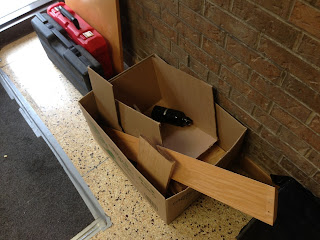Thornlea's existing launch system (the while triangle with all the stickers on it). You can see the Kel-Accel Race timing system as well.
A view of the Thornlea workshop and the first section of the 64' long modular track, which can be reduced in length down to 16' + an 8' run off. (an apostrophe (') means a measurement in feet)
Deciding how I am going to mount the race tree. At the beginning I considered doing a flip up unit, however the thought of this being a school environment caused me to re-think that idea.
A quick measurement of how high the existing unit was before I dismantled it.
After removing the existing launcher I realized that there was an extra 0.5" spur out the back. (a quotation mark (") means a measurement in inches).
A quick measurement deemed the existing timing system to sit 12" away from the back of the track. After talking with the teacher, it was deemed a good idea to integrate the mounting of it into the new launcher.
The Prototype, after much cutting and hot glue, it's finally complete. The top of the unit will hinge upward to allow the cars to be staged.
After cutting out some pieces and seeing how I would do final construction. this mock-up was at a point where I thought I would make the top out of acrylic glass, once again, it was deemed not a good idea in a educational environment to have such a easy to break material in a place where someone could potentially fall on top of it. The frame wood was then re-purposed for the side acrylic glass windows.
A quick test fit, and seeing where the provisions for the Race timing unit would be.
The final width of the launcher is 13"
A view of the inside of the launcher, the sides will be acrylic glass, that was spectators can see without taking a huge blast of compressed air in the face.
The 45 degree piece at the back top that will hinge the top. This is where I learned that it helps to pay attention in math class. Luckily my math teacher dropped by right in time for me to ask for help on the calculations. in the end, I missed by a little bit, however another cut on my table saw at home should solve that issue.
A view of how the 45 degree piece would fit into the final design.
That's all for the shop folks. It's working at home from here on in.
The box of stuff I took home to build this enclosure. The tools in the top left of the photo are provided by Prime Mechanical Co. (of Toronto, Ontario, Canada). I would like to thank them as well for providing the hard drive space to hold all the drivers and software for this project in addition to providing tools for assembly.
When I got home, I went right to work assembling the pieces I already had. The solenoid plate measures 13"W x 10"H. The 45 degree piece is a little more than 0.75" on the edge... which causes a problem which I will have to solve.
I will likely be taking a break from this here to re-focus on the electronics side of the unit provided my programmer is available, if anyone else is interested in writing a program for these Numato boards (RELAY16 and GPIO32). Then leave a comment or something and I'll get back to you.

















No comments:
Post a Comment